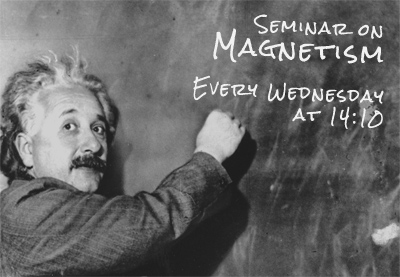Seminar on Magnetism
Group of Magnetism at the Department of Condensed Matter Physics
of Charles University and MGML has a pleasure to invite you to attend the joint seminar
on 22nd March 2023 at 14:10
at Faculty of Mathematics and Physics of Charles University, Ke Karlovu 5, 121 16 Praha 2
Lecture room F2
Silvie Černá
Hydrogen in anomalous rare earths; Ce and Yb systems
Hydrogen in anomalous rare earths; Ce and Yb systems
Silvie Černá » Hydrogen in anomalous rare earths; Ce and Yb systems
Hydrogen in anomalous rare earths; Ce and Yb systems
Online link: cesnet.zoom.us Ask R. Colman for password.
Location: Lecture room F2, 1st floor Ke Karlovu 5, Prague 2
Robust magnetic moments originating from localized 4f electronic states in lanthanides, determined by the Hund’s rules, are generally insensitive to volume expansion or interaction with conduction electrons. The magnetic order depends on the indirect exchange interaction of the RKKY type. Besides certain dependence on inter-atomic spacing d (the RKKY interaction has oscillatory sign and its envelope decays as 1/d3), the density of conduction electrons plays a major role.
In general, anomalous rare earths with unstable 4f configuration deserve a special attention among all rare-earth compounds. The anomalous rare-earth materials have the stability of integral 4f configuration and concomitant magnetic moments violated by the hybridization with conduction-electron states. Typical example are compounds of Ce. In such systems, the volume expansion prefers the stability, suppressing the valence fluctuations and leading to a Kondo state or even to magnetic ordering of stable 4f moments. The same tendency is supported by reducing the density of non-f states at the Fermi level by the H bonding, but due to the same reason the inter-site coupling (RKKY like) remains weak. The tendency can be illustrated on e.g. CeRuSi [1], where antiferromagnetism (TN = 7.5 K) is induced by hydrogen out of non-magnetic heavy-Fermion parent compound.
While Ce systems offer a possibility to suppress a magnetic state by applied pressure, Yb behaves to some extent opposite, high pressure naturally prefers a low-volume state, i.e. the magnetic 4f13 one. The main target of this talk is Yb2Pd2Sn. Surely we will have weakening of exchange interactions upon H-absorption as in Ce, but the question is what the volume expansion will do. If it is too big, we will end up in non-magnetic f14 as in YbH2 [2]. But Yb2Pd2Sn is very close to the verge of magnetism, so we are interested what happens on a fine scale.
[1] B. Chevalier, E. Gaudin, S. Tencé, B. Malaman, J.R. Fernandez, G. André, B. Coqblin, Hydrogenation Inducing Antiferromagnetism in the Heavy-Fermion Ternary Silicide CeRuSi. Phys. Rev. B: Condens. Matter Mater. Phys. 77 (1) (2008) 1−10.
[2] M.K Drulis and H. Drulis, Double Kondo-lattice-like system in the ytterbium deuterides, J. Alloys Comp. 366 (2004) 9–14.


